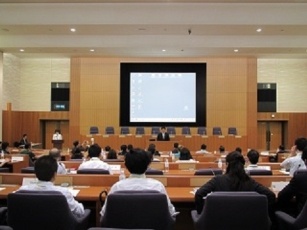VISA
2015 Seminar on Disaster Prevention Measures for Diplomatic Corps "Use of Information Technology for Confirming the Safety of Foreign Nationals Residing in Japan, and for Bi-directional Communication with Potential Victims"

Coinciding with the Disaster Prevention Week in Japan, the Ministry of Foreign Affairs (MOFA) invited diplomatic corps that represent nations whose nationals reside in Japan in large numbers, to participate in the 2015 Seminar for Diplomatic Corps. The seminar was held on September 2 at MOFA. At the outset, Mr. Yasuhide Nakayama, State Minister for Foreign Affairs, delivered an opening address.
This was followed by presentations on measures to promote and develop IT tools for helping confirm the safety of foreign residents in Japan as well as disseminate the information in the event of a disaster. These presentations were given by representatives from the Ministry of Internal Affairs and Communications, Osaka University and the Japan Tourism Agency.
After these presentations, a briefing by an official from the Consular Policy Division, MOFA was given on “Tabi-Regi (Travel Register)” system as a safety measure for Japanese nationals who travel overseas. After the conclusion of the seminar, participants were offered an opportunity to experience the strong jolts on an Earthquake Simulator, which parked in the MOFA parking lot.
1. Date held
Date held: Wednesday, September 2 from 1:30 p.m. to 4:00 p.m.
(in the International Conference Room, MOFA)
2. Participants (in no particular order)
(1) Diplomatic corps in Tokyo (36 individuals from 22 diplomatic missions)
Embassy of the People’s Republic of China
Embassy of the Republic of Korea
Embassy of the Republic of the Philippines
Embassy of the Federative Republic of Brazil
Embassy of the Socialist Republic of Viet Nam
Embassy of the United States of America
Embassy of the Republic of Peru
Royal Thai Embassy
Embassy of the Federal Democratic Republic of Nepal
Embassy of the Republic of Indonesia
Embassy of India
Her Britannic Majesty’s Embassy
Embassy of the Democratic Socialist Republic of Sri Lanka
Embassy of Canada
Australian Embassy
Embassy of France
Embassy of the People’s Republic of Bangladesh
Embassy of the Republic of the Union of Myanmar
Embassy of Malaysia
Embassy of the Grand-Duchy of Luxembourg
Delegation of the European Union
Embassy of Switzerland
(2) Ministries and Agencies and Local Government-related organizations etc. (11 organizations: 23 individuals and MOFA officials)
Ministry of Internal Affairs and Communications, Ministry of Foreign Affairs, Japan Tourism Agency, Osaka University and other organizations including private enterprises collaborating with these organizations
(3) Observers: Cabinet Office, Police Agency, Ministry of Justice, Council of Local Authorities for International Relations, Tokyo Metropolitan Government, Tokyo Fire Department, Minato Ward
3. Points Raised
(1) Shortly after the Great East Japan Earthquake hit in 2011, Consular Affairs Bureau of MOFA responded to many inquiries from embassies and supported their effort in confirming the safety of their nationals residing in Japan. Following on last year’s briefing session on the Safety Confirmation Process of missing foreign nationals in Japan in the event of disasters, this year’s seminar focused on the use of Information Technology or IT, such as use of mobile device apps to help confirm the safety of foreign nationals as well as disseminate the information in the event of a disaster. These themes were chosen against the background of Japanese government’s effort to promote Japan as a tourism-oriented country as well as of hosting the Tokyo Olympic and Paralympic Games in 2020.
(2) At the seminar, representatives from those addressing development and promotion of IT-based safety confirmation systems gave presentations on their products such as “OMOTENASHI App” by Ministry of Internal Affairs and Communications, “Multi-lingua, Wide view Disaster Information Predict System (CARED)” by Osaka University, and “Safety tips app” by Japan Tourism Agency. Also, an official of the Consular Policy Division of MOFA briefed the audience on “Tabi- Regi (Travel Register)” system as a safety measure for Japanese nationals travelling overseas.
(3) Many participants from diplomatic corps eagerly posed questions about development status of the apps the audience was introduced in the seminar, and the time frame expected for actual launch of such tools. Such eagerness was reflective of the audience’s high level of interest in using IT technology for disseminating the relevant information in multiple languages and for confirming the safety of foreign nationals in the event of a disaster.
(4) In the event of a disaster, it is important for the diplomatic corps to have tools that would help them reach and their nationals visiting or residing in Japan. In particular, it is often a challenge for diplomatic missions to obtain contact information and to get in touch with their nationals who are just visiting Japan as tourists, or those who are only temporarily staying in Japan. But these IT tools or apps could prove quite effective as conduit for information as well as for confirming the safety of their nationals.


 (8.3MB)
(8.3MB)